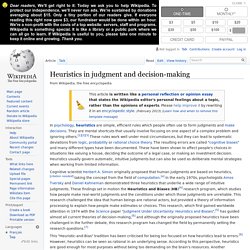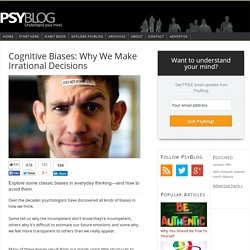

Heuristics in judgment and decision-making. In psychology, heuristics are simple, efficient rules which people often use to form judgments and make decisions.

They are mental shortcuts that usually involve focusing on one aspect of a complex problem and ignoring others.[1][2][3] These rules work well under most circumstances, but they can lead to systematic deviations from logic, probability or rational choice theory. The resulting errors are called "cognitive biases" and many different types have been documented. Cognitive Biases: Why We Make Irrational Decisions.
Explore some classic biases in everyday thinking—and how to avoid them.

Over the decades psychologists have discovered all kinds of biases in how we think. Some tell us why the incompetent don’t know they’re incompetent, others why it’s difficult to estimate our future emotions and some why we feel more transparent to others than we really appear. Many of these biases result from our minds using little short-cuts to help us navigate through a complicated world. Unfortunately the result can be that we reach irrational decisions. Understanding how these biases operate may help you make better decisions in all sorts of situations, both at home and work. 5 Common Mental Errors That Sway Your Decision Making.
Availability Heuristic. Representativeness Heuristic. Anchoring and Adjustment Heuristics. Emotional Bias. Bias (statistics) Behavioral Economics. Complexity. Nudge Theory.